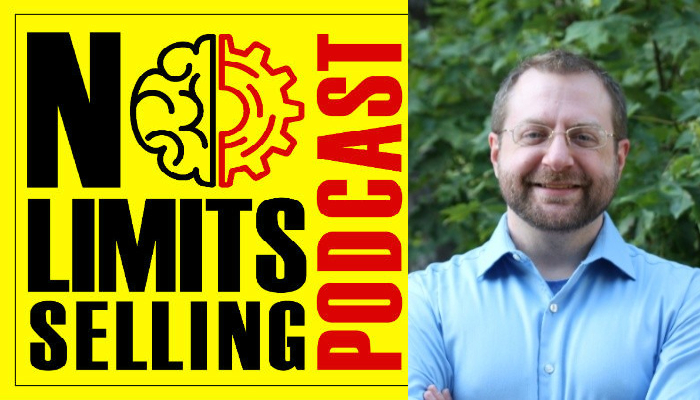5 Powerful Tactics on 'Sales to Profit' by Jeremy Pope
On Episode 142 of The No Limits Selling Podcast, we have Jeremy Pope, a former clinical and stage hypnotist who now helps entrepreneurs build scalable high-ticket businesses. He’s been a top salesperson, sales manager, and sales trainer for international businesses, including the direct-marketing giant Guthy Renker. Now, he helps small business owners repair broken discovery calls. You can join the free Facebook community at salescalloverhaul.com/join. In this episode, Jeremy shares 5 tactics for Sales to Profit.
Possible talking points/controversies-Why he hated marketing and resented sales for the first year of his entrepreneurial career, and had to learn it the ‘non-talented’ way.-If you’re like most salespeople, you don’t know HOW to pay attention to your prospect. Here’s what hypnosis can teach you about ‘sales mind-reading’-Why ‘asking for help on price objections’ will seize up your sales engine every time-3 Commitments that will help you close 15% more sales tomorrow-
How one prep mistake causes most business owners to lose great potential clients-What many salespeople do that’s like ‘putting on makeup without a mirror’-How using the wrong credibility factors can squash your sales-Don’t know your numbers? You’re closing 15% lower than you think, maybe on every step-3 Simple factors to decrease your sales cycle time - awareness, call prep, and commitments-Why most people ignore the most effective changes to their sales processes: unsexy is your secret weapon
Giveaway/Bonus for your audience: Sales Consolewww.salescalloverhaul.com/join
The Sales Call Overhaul live show is a weekly event in our free Facebook group where we rebuild broken sales calls live on the air - this is our $1800 offering, and we give it away to one winner every Friday. All group members can participate! (9 different factors)

Contact Jeremy:
[EDITOR’S NOTE: This podcast is sponsored by No Limits Selling. It is a fun, fast-paced podcast that delivers hard-fought business advice that you can implement today to improve your sales and performance]
Interested In Our Real Estate Coaching Services? Explore Our Website: Link
Feeling Not Well Today? You Can Use Our Mindset Boosters App To amp Up Your Mood: Link
Find us on Social Media:
LinkedIn | Facebook community | Instagram
Like what do you listen to? Subscribe to our podcast!
Ready to become fearless? We can help you become fearless in 60 days so you accomplish more in your career Schedule A 15 min Call with Umar
Summary
Introduction and Background
The podcast begins with Umar Hameed introducing Jeremy Pope, who he humorously refers to as the "Pope of Sales". Jeremy Pope is known for his unique approach to sales, which he refers to as "sales therapy". He explains that a significant part of his job involves fixing broken offers, funnels, and sales calls. He does this by identifying problem spots in sales goals and addressing them.
Sales Therapy and the Importance of Mindset
Jeremy emphasizes the importance of mindset in sales. He believes that what often stops people from executing at a higher level is their mindset. He uses the term "sales therapy" to describe his approach to addressing this issue. He is not a therapist, but he uses therapeutic techniques to help salespeople overcome their mental barriers.
Fixing Broken Offers and Funnels
Jeremy shares his experience of fixing broken offers and funnels. He explains that he often works with recruiters who have two sales to make: one for the candidate and one for the client. He helps them refine their messaging and timing to ensure they are reaching the right people and solving a problem that their audience needs to be solved.
Building Trust and Establishing Relevance
Jeremy discusses the importance of building trust and establishing relevance in sales. He prefers to talk about "reach, relevance, and resonance" rather than the traditional "know, like, trust" factors. He explains that "reach" is about having access to the right audience, and "relevance" is about solving a problem that the audience needs to be solved.
The Importance of Framing and Emotional Connection
Jeremy emphasizes the importance of framing in sales calls. He explains that framing is about setting the context and controlling the narrative of the sales conversation. He also highlights the importance of establishing an emotional connection with the prospect. He believes that many salespeople fail to get to the emotional core of the call, which is crucial for making a sale.
Conclusion
In this podcast, Jeremy Pope, a seasoned sales expert, shares his unique approach to sales, which he refers to as "sales therapy". He emphasizes the importance of mindset, strategic communication, and emotional connection in sales. His approach involves identifying and addressing problem areas in sales goals, refining messaging and timing to reach the right audience, and solving relevant problems for the audience. He underscores the significance of setting the right context or frame during sales conversations and handling the close with confidence and transparency.
By bringing up concerns or worries upfront, he believes salespeople can alleviate pressure and allow the inherent tension of the situation to guide the conversation toward a successful close. His insights provide valuable strategies for enhancing sales performance and achieving better outcomes.
Questions & Answers
What is Jeremy Pope's unique approach to sales?
How does Jeremy Pope define 'sales therapy'?
What are the 'reach, relevance, and resonance' factors in sales according to Jeremy Pope?
Why is framing important in sales calls according to Jeremy Pope?
What is Jeremy Pope's advice on closing a sale?
How can 'sales therapy' enhance sales performance?
Don’t miss this opportunity to transform your real estate career with one-on-one coaching. As an experienced real estate coach, I, Umar Hameed, am dedicated to helping you unlock your full potential and achieve your real estate goals. To learn more about who am I and my clients ↓
If you’re ready to take the next step, book an appointment with me today and begin your journey toward success in the real estate industry.
